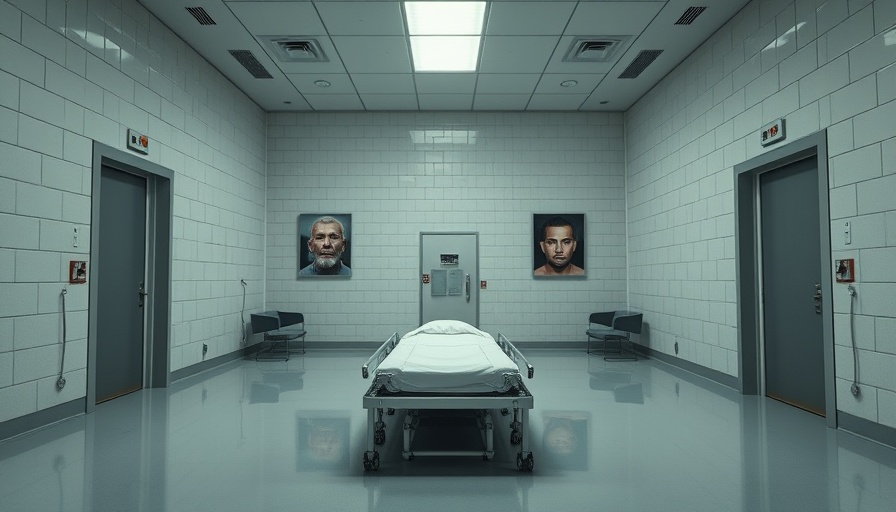
A Grim Reminder: Execution in the USA
On a quiet evening, two death row inmates faced their final moments just minutes apart, highlighting the ongoing debate surrounding capital punishment in America. Anthony Wainwright was executed in Florida, while Gregory Hunt met the same fate in Alabama, both for heinous acts committed decades ago. This extraordinary occurrence of back-to-back executions serves as a stark reminder of the deeply divided opinions on the death penalty across the nation.
The Shadows of Their Crimes
Anthony Wainwright, 54, executed by lethal injection, had been on death row for nearly three decades after the brutal rape and murder of Carmen Gayheart, a mother of two, in Lake City, Florida. His final act of violence in 1994, in which he and his accomplice abducted Gayheart at gunpoint, followed by unspeakable acts of cruelty, shocked the local community. Gayheart's sister, Maria David, had meticulously tracked the lengthy legal proceedings since her sister's death, eagerly awaiting the closure this execution brings.
Justice, however, delivered a sort of redemption late for David: "I’m looking forward to getting the last pieces of paperwork that say he’s been executed to put into the book and never having to think about Anthony Wainwright ever again,” she remarked, signifying how these events reverberate through the lives impacted by such tragedies.
Two States, Two Methods of Execution
In Alabama, Gregory Hunt was executed just four minutes after Wainwright, with his life ending via nitrogen hypoxia—a relatively new method that has stirred discussions about humane execution practices. Hunt's crime, which involved bludgeoning Karen Lane to death in 1988, alongside reports of severe physical abuse, underscores the brutality often associated with such cases. His execution adds to the troubling trend of increasing death penalty cases in certain states.
The Legal Tangle Surrounding Capital Punishment
Both executions were marred by layers of legal arguments. Wainwright's lawyers made a last-ditch effort to prevent his execution, claiming that his cognitive impairments stemmed from his father's exposure to Agent Orange in Vietnam, arguing that this condition diminished his legal culpability. This plea adds to the complex narrative surrounding the death penalty—one entwined in legal nuances and ethical debates about mental health and accountability.
However, the U.S. Supreme Court dismissed these arguments, further reflecting the often rigid stance towards appeals in capital cases. It reveals a judicial landscape where the law operates with unyielding precision, often leaving family members caught in the emotional whirlwind of justice and vengeance.
An Ongoing Debate: Public Sentiment and Practical Implications
The executions have reignited discussions about the death penalty's efficacy and morality. Numerous states have recently advanced their execution policies, as seen in Florida and Alabama. According to the Death Penalty Information Center, this year marks the fourth time double executions have occurred, raising questions about the administration of capital punishment's fairness and its role as a deterrent against violent crime.
While supporters advocate for its use as necessary retribution against violent offenders, opponents argue that it is an outdated practice fraught with the potential for wrongful convictions, human rights violations, and significant psychological toll on the families of victims and the executed alike. This moral quagmire begs the question of whether society can ever truly consider itself just while maintaining the death penalty as a tool of justice.
A Future with Potential Change?
As the United States navigates this complex terrain, the future of the death penalty remains uncertain. Some states have begun to reconsider their stances, as public sentiment shifts towards more humane forms of justice. Discussions on alternatives, such as life imprisonment without parole, are gaining traction as society grapples with the implications of capital punishment and seeks a more equitable judicial system.
Beyond the legal ramifications, the personal narratives behind these executions reveal an emotional tapestry that is often ignored in discussions of policy. Families affected by violence—both victims' and offenders'—must contend with loss, anger, and a quest for closure, marking the profound human cost of our judicial decisions.
Concluding Thoughts
The executions of Anthony Wainwright and Gregory Hunt serve not only to mark the end of life but also to spotlight the critical conversations around justice, redemption, and the moral fabric of our society. Whether one stands for or against the death penalty, these instances underline the resilience of those affected by tragic violence and the ongoing dialogue necessary to shape our future as a just and humane nation.
 Add Row
Add Row  Add
Add 



Write A Comment